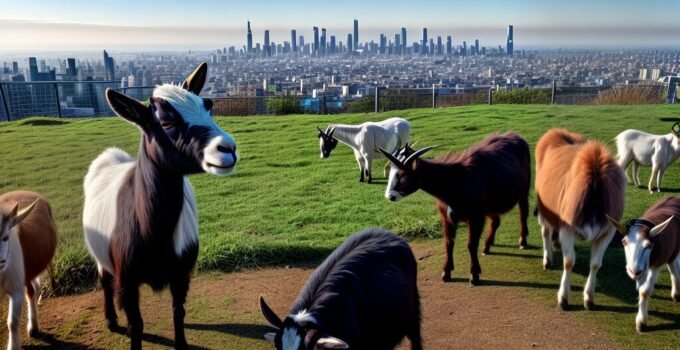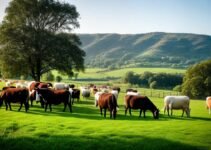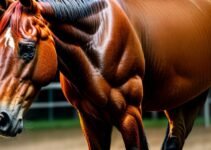Urban goat keeping has become a growing trend among people who are looking for sustainable and organic ways to produce their own food. Goats are ideal for urban backyard keeping because they are versatile, easy to care for, and provide milk, meat, and fiber. However, not all goat breeds are suitable for urban living. In this article, we will discuss the best goat breeds for urban backyard keeping and the factors to consider when selecting goats for city living.
Key Takeaways:
The best goat breeds for urban backyard keeping are those that are small in size, docile in nature, and adaptable to urban environments.
Nigerian Dwarf goats, Pygmy goats, Miniature Silky Fainting goats, Alpine goats, and Boer goats are among the top choices for urban backyard keeping.
Fencing and housing considerations, as well as feeding and care, are crucial factors to ensure the well-being of urban backyard goats.
Factors to Consider for Urban Goat Keeping
When selecting goat breeds for urban backyard keeping, there are several factors that should be taken into consideration. These factors include the size of the goats, their temperament, and their adaptability to urban environments.
Size: Since urban backyards are often limited in space, it is important to choose goat breeds that are smaller in size. Smaller breeds, such as Nigerian Dwarf and Pygmy goats, are ideal for urban settings as they require less space and are easier to handle.
Temperament: Urban backyard goat keeping requires goats with friendly and docile personalities. Some breeds can be more aggressive and territorial, making them unsuitable for urban environments. Nigerian Dwarf, Pygmy, and Alpine goats are known for their friendly nature and adaptability to urban settings.
Adaptability: Urban environments can be noisy and stressful for animals, so it is important to select goat breeds that can adapt well to these conditions. Nigerian Dwarf and Pygmy goats are often recommended for urban backyard keeping as they are adaptable to various climates and environments. Alpine goats are also adaptable and can thrive in different settings.
Nigerian Dwarf Goats
If you are looking for a small and friendly goat breed for your urban backyard, Nigerian Dwarf goats may be the perfect choice for you. These goats are known for their small size, cute appearance, and playful personality, making them great pets and milk producers for small spaces.
Despite their small stature, Nigerian Dwarf goats are excellent milk producers, offering around 1-2 quarts of milk per day. The milk is high in butterfat, making it ideal for cheese and other dairy products.
One of the benefits of Nigerian Dwarf goats is their adaptability to a variety of climates, making them suitable for urban areas with different weather patterns. These goats also have a docile temperament, making them easy to handle and train, especially if they are raised from a young age.
It is important to note that Nigerian Dwarf goats require adequate shelter and fencing, as they are susceptible to cold temperatures and predators. However, due to their small size, they don’t require as much space as larger goat breeds, making them an excellent choice for urban backyard keeping.
If you are interested in keeping Nigerian Dwarf goats in your backyard, it is crucial to provide them with a balanced diet consisting of hay, grains, and fresh water. Additionally, regular veterinary check-ups and health maintenance are necessary to ensure the well-being of your goats and prevent potential illnesses.
Pygmy Goats
Pygmy goats are a popular choice for urban backyard keeping due to their small size, low maintenance requirements, and playful personalities. They typically weigh between 40 and 60 pounds and stand about 16 to 22 inches tall. Pygmy goats come in a variety of colors and patterns, making them visually appealing as well.
These goats are also known for their hardiness and adaptability to different climates, making them a suitable option for urban areas with varying weather patterns. Pygmy goats are generally friendly and curious, making them great companions for families with children or those who want a goat that is easy to handle and interact with.
While Pygmy goats are not typically used for milk production, they can provide a small amount of milk for personal use. They are primarily raised for their meat and fiber, as their cashmere-like coats can be harvested for textiles.
Pygmy Goat Care
Pygmy goats require a similar level of care as other goat breeds. They need access to fresh water and hay, as well as a balanced goat feed. It is important to ensure that their diet is high in fiber and low in grains, which can cause digestive problems.
Pygmy goats also need shelter from the elements, such as a sturdy and dry goat house. It is essential to regularly clean their living space to prevent diseases and infections. In terms of health care, Pygmy goats require regular deworming, vaccinations, and check-ups with a veterinarian.
Miniature Silky Fainting Goats
Miniature Silky Fainting goats, also known as “Myotonic” goats, are an ideal breed for urban farming due to their small size and docile temperament. They are popular among backyard keepers for their unique fleece, which can be harvested for fiber, as well as for their suitability for milk production.
These goats are known for their fainting episodes, where they temporarily freeze and fall over when startled. However, this condition is not harmful and does not cause any pain to the animal. In fact, it makes them easier to handle and less likely to escape, making them a great choice for urban backyard keeping.
| Size | Miniature Silky Fainting goats are small in size, with an average height of around 18-24 inches at the shoulder and weighing up to 50 pounds. |
|---|---|
| Temperament | They are known for their docile and friendly nature, making them great pets for families with children. |
| Fleece | They have a long, silky coat that requires minimal grooming and can be harvested for soft and luxurious fiber. |
| Milk Production | Miniature Silky Fainting goats are capable of producing up to 2 quarts of milk per day, with a butterfat content of around 7%. |
Overall, Miniature Silky Fainting goats are a great choice for urban backyard keeping, as they are easy to care for, require minimal space, and produce fiber and milk in addition to being great pets.
Alpine Goats
Alpine goats are known for their adaptability, versatility, and excellent milk production, making them an excellent choice for urban backyard keeping. These goats are medium to large in size, with does weighing between 120 and 135 pounds and bucks weighing between 170 and 180 pounds.
The Alpine breed is very hardy and has excellent health and resistance to diseases making them easy to care for and maintain. They are also very adaptable to various climates, making them an ideal choice for urban goat keeping.
Alpine goats are prized for their milk production capabilities, with an average doe producing up to 3,000 pounds of milk per year. Their milk is known for its quality, high butterfat content and excellent taste, making it ideal for cheese and yogurt production.
One of the benefits of Alpine goats is their versatility as they can also be used for meat production. They are also an excellent choice for brush clearing as they are browsers and will eat weeds, bushes, and other plants that might be present on your property.
Choosing an Alpine Goat
When selecting an Alpine goat for urban backyard keeping, it is important to consider their temperament. These goats are known for being friendly and easy to handle, making them ideal for families with children or first-time goat owners. Additionally, their ability to adapt to various environments also makes them a good choice for small spaces.
The Alpine breed comes in a variety of colors including black, white, and brown with black markings on their face, legs, and back. They also have erect ears and straight noses that give them a distinct look.
Conclusion
If you are considering goat keeping for milk production, meat production or even just for backyard clearing, the Alpine goat breed is an excellent choice for urban backyard keeping. Their adaptability, excellent health and disease resistance, versatility, and milk production make them the perfect addition to your sustainable urban farming practices.
Boer Goats
Boer goats are a popular breed for urban homesteading due to their hardiness, adaptability to various climates and their meat production capabilities. Originated in South Africa, Boer goats are typically large and muscular, with a distinctive white body and red head. They have a docile temperament and are easy to handle, making them ideal for beginners in goat keeping.
Boer goats are known for their superior weight gain and meat quality. They are highly efficient at converting food into meat, which makes them a profitable addition to any urban farming operation. Boer goats are also able to thrive on a variety of forages and can adapt to various feeding systems.
When selecting Boer goats for urban homesteading, it is important to ensure that they have adequate space to graze and exercise. Fencing requirements are also important, as Boer goats are strong and can easily escape if not properly contained. A secure enclosure with a sturdy fence is essential for Boer goats.
Boer goats are relatively low maintenance, but they do require routine health checks and vaccinations. Proper nutrition is also important for their growth and overall health. A balanced diet of forages and grains can help ensure that Boer goats stay healthy and productive.
Overall, Boer goats are a great choice for urban homesteaders looking to produce high-quality meat in a small space. They are hardy, adaptable and easy to care for, making them an ideal breed for those new to goat keeping.
Fencing and Housing Considerations
When it comes to urban goat keeping, proper fencing and housing are crucial for the safety and well-being of the animals. goats are known for their ability to escape and climb over or through fences, so it’s important to have a secure enclosure to keep them contained.
A sturdy fence should be at least 4 feet tall and made of a strong material such as woven wire or chain link. It’s also recommended to bury the fence several inches below ground to prevent goats from digging underneath it.
In addition, a shelter should be provided to protect the goats from extreme weather conditions such as heat, rain or snow. This can be a small shed or even a converted dog house with adequate ventilation and enough room for all the goats to comfortably lie down.
Space is also an important consideration for urban goat keeping. Goats are active animals and need enough space to exercise and play. As a general guideline, a minimum of 200 square feet per goat is recommended for a small urban backyard. It’s important to ensure that the goats have access to both indoor and outdoor areas.
Feeding and Care
Feeding and caring for urban backyard goats require attention and dedication. You need to ensure they get adequate nutrition, proper health care, and exercise opportunities. Here are some guidelines to follow:
Nutrition
Goats need a balanced diet to maintain good health and produce quality meat or milk. You should provide them with fresh, clean water at all times and access to good quality hay or pasture. Additionally, you can supplement their diet with grains, minerals, and protein-rich feeds, depending on their age, weight, and productivity. Consult with a veterinarian or livestock nutritionist for specific feeding recommendations.
Health Care
Keep your urban goats healthy by scheduling regular veterinary check-ups, vaccinating them against common diseases, and maintaining a clean and hygienic living environment. Inspect their hooves, teeth, and coat regularly to spot any signs of disease or injury early. Also, practice good biosecurity to prevent the spread of zoonotic diseases and parasites that may affect both humans and animals.
Exercise and Playtime
Goats are social animals that need plenty of exercise and mental stimulation to thrive. Ensure they have enough space to roam, run, and jump around in a safe and secure environment. You can provide them with toys, climbing structures, and other play equipment to keep them mentally stimulated and entertained. Additionally, consider giving them access to other goats or farm animals to prevent boredom and social isolation.
Conclusion
In summary, urban goat keeping is a practical and sustainable way to incorporate livestock into city living. When selecting goat breeds for urban backyard keeping, several factors should be considered such as size, temperament, and adaptability to urban environments. Among the top picks for urban goat breeds are Nigerian Dwarf goats, Pygmy goats, Miniature Silky Fainting goats, Alpine goats, and Boer goats.
Proper fencing and housing are crucial for maintaining the safety and health of urban backyard goats. It is essential to provide secure enclosures, shelter, and enough space for exercise. Feeding and caring for urban backyard goats require proper nutrition, regular veterinary check-ups, and health maintenance.
By incorporating goats into urban farming practices, individuals can benefit from their milk, meat, and fiber production capabilities while reducing their carbon footprint. Urban goat keeping also provides a unique opportunity for education and community building. Overall, choosing the right goat breeds for urban areas can add value to sustainable living in the city.
FAQ
Q: What are the best goat breeds for urban backyard keeping?
A: The best goat breeds for urban backyard keeping include Nigerian Dwarf goats, Pygmy goats, Miniature Silky Fainting goats, Alpine goats, and Boer goats.
Q: What factors should be considered when choosing goats for urban areas?
A: When choosing goats for urban areas, factors such as size, temperament, and adaptability to urban environments should be considered.
Q: What are Nigerian Dwarf goats?
A: Nigerian Dwarf goats are small in size, friendly in nature, and suitable for urban settings. They are known for their milk and meat production capabilities.
Q: What are Pygmy goats?
A: Pygmy goats are popular among urban backyard keepers due to their small size, low maintenance requirements, and playful personalities.
Q: What are Miniature Silky Fainting goats?
A: Miniature Silky Fainting goats are ideal for urban farming due to their small size, docile temperament, and unique fleece. They are suitable for milk and fiber production.
Q: What are Alpine goats?
A: Alpine goats are known for their adaptability, versatility, and excellent milk production. They are suitable for urban backyard keeping.
Q: What are Boer goats?
A: Boer goats are a popular breed for urban homesteading due to their meat production capabilities, hardiness, and adaptability to various climates.
Q: What are the fencing and housing considerations for urban goat keeping?
A: Fencing and housing considerations for urban goat keeping include secure enclosures, shelter, and adequate space for exercise.
Q: What are the feeding and care guidelines for urban backyard goats?
A: Feeding and care guidelines for urban backyard goats include proper nutrition, health maintenance, and regular veterinary check-ups.



